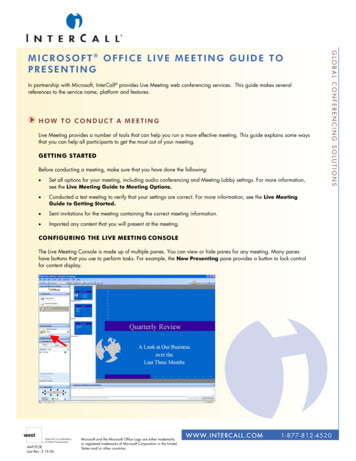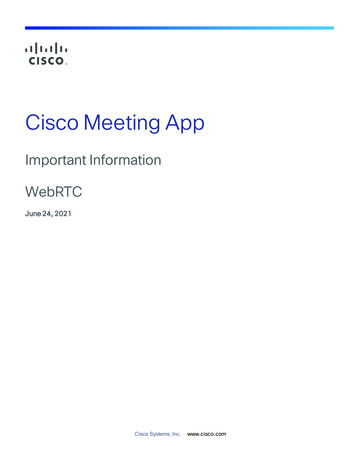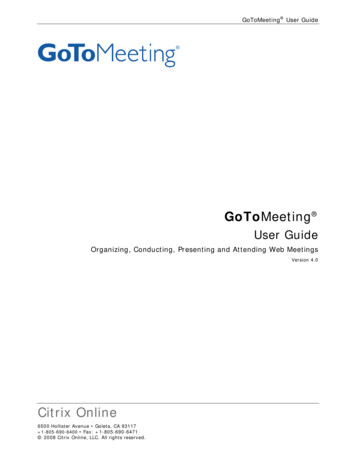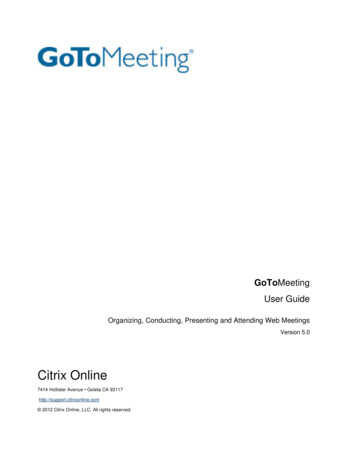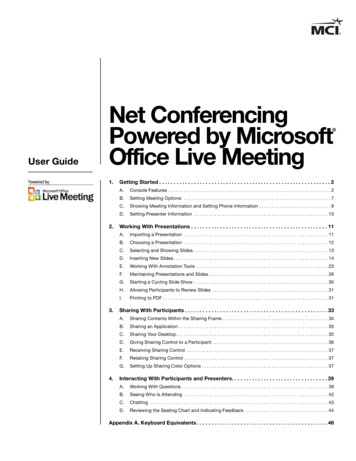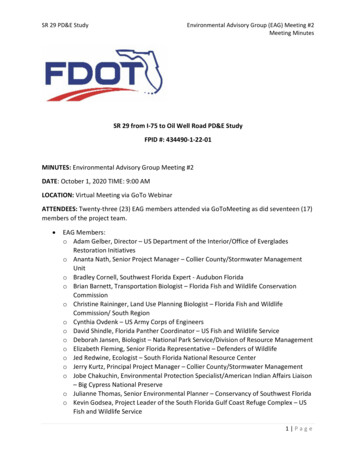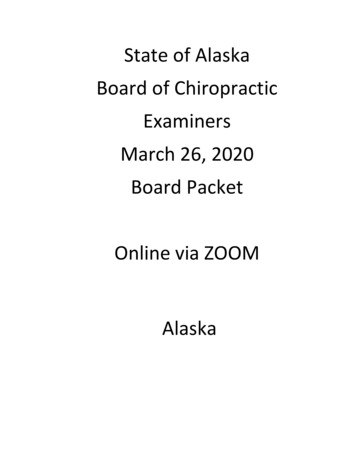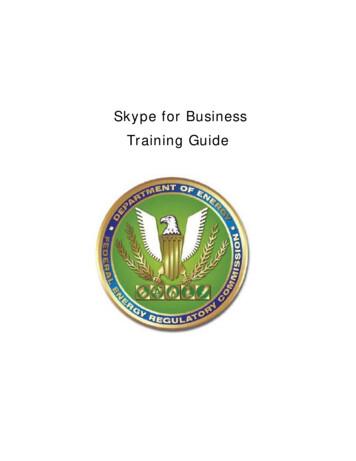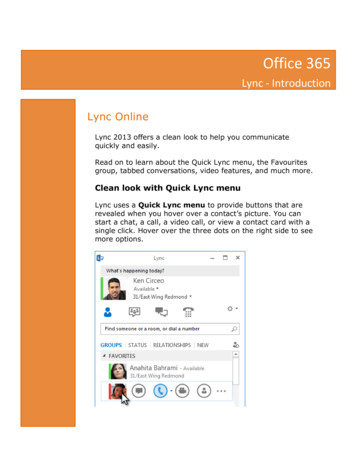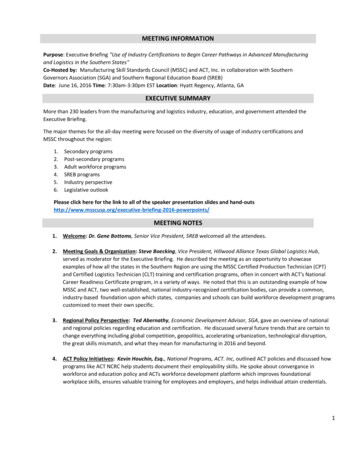
Transcription
MEETING INFORMATIONPurpose: Executive Briefing "Use of Industry Certifications to Begin Career Pathways in Advanced Manufacturingand Logistics in the Southern States"Co-Hosted by: Manufacturing Skill Standards Council (MSSC) and ACT, Inc. in collaboration with SouthernGovernors Association (SGA) and Southern Regional Education Board (SREB)Date: June 16, 2016 Time: 7:30am-3:30pm EST Location: Hyatt Regency, Atlanta, GAEXECUTIVE SUMMARYMore than 230 leaders from the manufacturing and logistics industry, education, and government attended theExecutive Briefing.The major themes for the all-day meeting were focused on the diversity of usage of industry certifications andMSSC throughout the region:1.2.3.4.5.6.Secondary programsPost-secondary programsAdult workforce programsSREB programsIndustry perspectiveLegislative outlookPlease click here for the link to all of the speaker presentation slides and -2016-powerpoints/MEETING NOTES1.Welcome: Dr. Gene Bottoms, Senior Vice President, SREB welcomed all the attendees.2.Meeting Goals & Organization: Steve Boecking, Vice President, Hillwood Alliance Texas Global Logistics Hub,served as moderator for the Executive Briefing. He described the meeting as an opportunity to showcaseexamples of how all the states in the Southern Region are using the MSSC Certified Production Technician (CPT)and Certified Logistics Technician (CLT) training and certification programs, often in concert with ACT's NationalCareer Readiness Certificate program, in a variety of ways. He noted that this is an outstanding example of howMSSC and ACT, two well-established, national industry-recognized certification bodies, can provide a common,industry-based foundation upon which states, companies and schools can build workforce development programscustomized to meet their own specific.3.Regional Policy Perspective: Ted Abernathy, Economic Development Advisor, SGA, gave an overview of nationaland regional policies regarding education and certification. He discussed several future trends that are certain tochange everything including global competition, geopolitics, accelerating urbanization, technological disruption,the great skills mismatch, and what they mean for manufacturing in 2016 and beyond.4.ACT Policy Initiatives: Kevin Houchin, Esq., National Programs, ACT. Inc, outlined ACT policies and discussed howprograms like ACT NCRC help students document their employability skills. He spoke about convergance inworkforce and education policy and ACTs workforce development platform which improves foundationalworkplace skills, ensures valuable training for employees and employers, and helps individual attain credentials.1
5.Breakout Sessions : Four break-out sessions took place throughout the morning and afternoon led by panels ofindustry, education and government leaders focusing on highlighting success stories and model programs fromsixteen states in the southern region.Session One: Secondary ProgramsModerator: Don Gogan, VP Operations Management, Harley DavidsonIndividual State Focus:Florida Statewide MSSC Deployment in High Schools Marilyn Barger, Executive Director, Florida Advanced Technician Education and Kathie Schmidt, Director,Career & Technical Education, St. Lucie County Public Schools described their statewide program in whichstudents receive up to 15 college credits for full CPT certification towards the A.S. Engineering TechnologyDegree. Students are selected into the program during their sophomore year at Treasure Coast HS where theyexpress interest or opt-in to the pre-engineering program (their freshman year is spent focusing on what itmeans to be successful in high school and beyond)."Oklahoma High School Partnerships Cassity Bixby, OSU Institute of Technology – MidAmerica Industrial Park Advanced Training Center, andThunderbird Youth Academy spoke about their site on the campus of the MidAmerican Industrial ParkAdvanced Training Center to help develop the pipeline of future workers. MidAmerica pays for full tuition forhigh school students to obtain CPT certification. Shawn England, Recruiting Coordinator, Thunderbird Youth Academy described the National Guard Youthresidential program that leads, trains and mentors 16-18-year-old high school dropouts. This program hasbeen recognized as one of the nation’s most effective and cost efficient programs for targeting youth who areat the greatest risk for substance abuse, teen pregnancy, delinquency and criminal activity.Kentucky Industry-led Statewide MSSC Deployment in High Schools Debbie Anderson, Career & Technical Education, Doss High School in KY spoke about an upcoming pilotprogram for high school juniors and seniors that will enable them to receive full CPT certification through theManufacturing Engineering Technology Pathway of study by high school graduation. Students will also receivea “work ethic certificate” to document their employability skills. The program also includes summerinternships and employer mentoring.Tennessee Battelle for Kids/ACT Initiative Joe T. Wood, State Coordinator for Tennessee, Battelle for Kids and Donna Mason, Account Manager forTennessee, ACT discussed how offering CPT programming in TN will foster success of rural communities in thestate and how it will impact the success of the state as a whole. They spoke about the importance ofinnovating and helping educators nationally and internationally to adopt high-impact strategies and solutionsfor sustainable impact in their school systems. They detailed how the courses and resources available throughthe Tennessee Portal are designed to help rural educators improve classroom practices and help studentsprepare for college and career, and attract jobs to rural communities. David Barbour, Education Consultant and Program Area Supervisor, North Carolina Department of PublicInstruction spoke about his agency’s work to align all educational offerings with recognized industryththcertifications. CPT was integrated into 9 and 10 grade classes at 13 schools. 22 classes were delivered in the2015-2016 school year. NC DPI felt the CPT fully met the industry demands for pipeline development and it2
was chosen because of the diversity and versatility of the courses to successfully train entry-level productionworkers in all sectors of manufacturing. Lori Kelley-Burdine, Director of Public Information and Planning, DSCC/Workforce Development Division,Northwest TN Workforce Board described their work under a LEAP grant to offer the NCRC and CPT to highschool students. Students must earn a silver level on NCRC to enter the CPT program. Students had the mostsuccess with very experienced instructors and hands-on training. They also felt that the Quality moduleshould be third in sequence, after production, rather than second. Gene Bowman, Director, Alamo Academies (TX) described the Alamo Academies program which implementedCPT in 2011. Juniors and Seniors in the program earn CPT Safety and Quality, respectively prior to participatingin summer internships. Summer internships are paid jobs (approximately 3,000) by the employer partners,the secondary school district provides transportation to the college and all textbook materials, and the collegeabsorbs the tuition fees for the students.Regional Focus: Preview of MSSC Briefing on “Transforming High School Career Counseling” at SREB “High Schoolsthat Work” July Conference, Louisville, KY Jan Bray, President, Bray Strategies, and Executive Director (ret.), Association for Career Technical Education &LeeSa Page, Senior Advisor for KY, MSSC gave a presentation about efforts to transform high school careercounseling. One issue is how career counseling will be funded. Positions should be funded throughindustry/chamber employer-represented organizations. Career advisors should not come from currentacademia or guidance counselor positions.Session Two: Post-Secondary ProgramsModerator: Harry Moser, Founder and President, Reshoring InitiativeIndividual State Focus: Christopher Klusmeyer, Manufacturing Instructor, Mineral Area College, Tina Miller, Program SupportSpecialist/Program Navigator, Mineral Area College & Liz Roberts, Deputy Grants Manager, MissouriCommunity College Association (MO) presented about their use of industry certifications including CPT, CLT,NIMS and AWS and the importance of offering college credit for those credentials. Donna Ludwig, Account Manager, Business Services, Rowan-Cabarrus Community College & Craig Lamb, VP,Rowan-Cabarrus Community College (NC) presented about the North Carolina Manufacturing Institute’s visionto build a world class talent pool to support the retention and growth of regional manufacturers. Kenneth Parker, Director of Manufacturing Solutions, Corporate & Community Education, SpartanburgCommunity College (SC) presented about their CPT program and the success of drawing a large employer likeBMW to the state by agreeing to provide them with a certified workforce. Cory Werkheiser, Career Services Specialist, Patrick Henry Community College (VA) spoke about the skillsneeds in Martinsville, VA area, which is going through an advanced manufacturing expansion with many newindustries coming to the region. He detailed the benefits of MSSC CPT and CLT programs to local employerssuch as Eastman Chemical. Mr. Wekheiser also spoke about the challenges of upgrading the image ofmanufacturing and overcoming the narrative that there is no manufacturing in the United States, or the regionand the importance of increasing industry credentials within the region to demonstrate to employers thequality of the workforce. Lidell Greenway, VP of Economic Development, Wiregrass Georgia Technical College (GA) spoke about theimportance of dual enrollment and/or dual credit programs.3
Scott Howie, Director, Northark Technical Center (AR) presented about the need for more certificationopportunities.Jay Bouis, Director of Technical Training and MSSC Site Coordinator, Community College of Baltimore (MD)spoke about how CCBC began using MSSC credentials, first with logistics / CLT and then more recently withmanufacturing / CPT. He discussed some lessons learned as they rolled out programming in workforcecontinuing education formats, sometimes with partial credentials rather than full certification profiles. This isa bit of a different model than embedding MSSC in credit semesters.Regional Focus: Dr. John Foster, President/CEO, NOCTI & NOCTI Business Solutions discussed increase in credentialing and theimportance of having valid and reliable assessments being accredited by a credible international third partysuch as ANSI/ISO.Session Three: Adult Workforce ProgramsModerator: Steve Harrington, VP, Distribution Management Association, and Industry Liaison, National Center forSupply Chain Logistics EducationIndividual Program Focus: Rebekah Hutton, VP Strategic Initiatives, MSSC spoke about their work with the military to help active duty,reserve and guard members earn industry credentials prior to separation from service. She also emphasizedthat one of the primary results of early pilot programs was the discovery of the significance of the languagebarrier between military and civilian occupations. Paul Perkins, President & CEO, Amatrol explained the history between MSSC and Amatrol who developed anddelivers the online CPT curriculum. He specifically highlighted successful programs in Florida and Tennessee.He also discussed how CPT is imbedded into a technical apprenticeship and that certifications like CPT helpprofessionalize the first step into an apprenticeship. Cindy Read, Director, Center Strategies, KentuckianaWorks described her work with the Workforce Board inLouisville, KY. They adopted a manufacturing partnership program because several large employers werereinvesting. They identified MSSC for training and certification. To date, they have 641 NCRCs, 270 full-CPTs,and 185 have been placed in jobs. Over 1500 MSSC certificates have been issued. Tracey Crawford, Instructor, Bobby Dodd Institute (GA) discussed their program which focuses on providingtraining and employment to individuals with disabilities or other barriers to employment. They’ve hadsignificant success with CLA and CLT. David Setzer, Executive Director, Workforce Solutions North Central Texas gave background of how WSNCTworked with MSSC in 2006 to develop the CLT program. He discussed how employers who were early adoptersof the program gave preference to certified job applicants because they found them more easily trainable ontheir customized/proprietary systems. Jeff Lynn, Executive Director, Workforce Development Programs LED FastStart talked about theirmanufacturing program which began as a two-year technical program but is now begin pushed down into thethhigh schools, starting as early as 9 grade.ACT Work Ready Communities: Debra Lyons, Senior Director, External Engagement and Programs, Center for Workforce Advancement, ACT,Inc., Sondra C. Redmon, Director of Workforce Development, Central Louisiana Economic DevelopmentAlliance and Ruth R. Nichols, Ed.D., Assistant VP for Community and Economic Development, Alcorn StateUniversity discussed building workforce development eco-systems that align efforts to support manufacturing.They discussed the NCRC, common employability skills and stackable credentials. The discussion also includedthe challenges in rural communities to engage both employers and students, but in Central Louisiana they’ve4
had success with NCRC. In Mississippi, they have discovered that in rural areas where the workforce is sospread out, it benefits everyone when communities collaborate to raise the skill level of that workforce.Florida Prison Systems: Rick Frazier, Director, TCC/Gadsden Re-Entry Center, Kristian Fince, Program Coordinator Marc Dick, Vocational Instructor, and Amy O’Donnell, Program Specialist & MSSC Site Coordinator spokeabout their re-entry facility which is the only such facility in the US that is located on a community collegecampus. They offer GED and vocational programs like CPT. They also discussed the challenges of suchprograms including restrictions on materials provided to and maintained by students.Session Four: SREB ProgramsModerator: Gene Bottoms, Senior Vice President, SREB moderated the session entitled Credential for All:Designing Advanced Career Pathways That Teach the Mix of Soft, Applied Academics and Workplace Skills Neededfor Today’s Economy.Presenters: Toby Craver, Integrated Production Technology Instructor, Fountain Lake High School, Hot Springs, AR Zach Riffell, Co-Director, Advanced Career, Marketing, SREBThe SREB presenters reported on two new curricula related to MSSC's focus on manufacturing and Logistics:Integrated Production Technologies and Global Logistics & Supply Chain Management. Both are SREB "AdvancedCareer" courses focused on a rigorous and relevant blend of technical and academic skills in authentic projects."Advanced Career" provides ready-to-implement AC course work for students, comprehensive training forteachers, access to tools and technology for project-based learning, end-of-course assessments, and opportunityfor industry certification and/or dual credit.6.Luncheon Awards: Leo Reddy, Chair & CEO, MSSC presented awards to the following for outstanding support ofMSSC programs:7.Industry Perspective: Moderator: Leo Reddy, Chair & CEO, MSSCPresenters: Mary Batch, Assistant Manager, Human Resource Development, Toyota Motor Manufacturing, Texasdescribed their successful program with Alamo Academies. All student workers that come through theirfacility must have completed and passed CPT Safety prior to work because it embodies the foundational safetyskills all workers need in a manufacturing environment. They have had 70 students in 6 years that completedthe Alamo Academies program in high school. Those students have gone on to post-secondary education orobtained high position within the military. Toyota has hired 20 students from that group. Stephanie Borowski, President, GPS Education Partners explained their program which focuses on giving atrisk youth an opportunity to receive full-CPT certification in an embedded work-and-learn environment in oneof the areas 120 sponsoring companies, 2000 hours of apprenticeship training, and their high school diploma. Don Gogan, VP for Operations Management, Harley Davidson spoke about the company’s mission to “fulfilldreams of personal freedom.” As long-time supporter of MSSC, Harley feels strongly that the CPT certificationis a path to personal freedom by providing opportunity to good paying jobs, by laying the foundation for solidfoundational skills and path to higher education or higher-skill, specialized credentials.8.Military Use of Civilian Certifications: Rebekah Hutton, VP Strategic Initiatives, MSSC explained MSSC’sinvolvement with the military in supporting the DOD initiative to help active duty, reserve and guard members5
earn industry credentials prior to separation from service. The military, and the Army in particular, have embracedCLT to certify hundreds of Soldiers and other Service Members. A key element of the military’s use and funding ofcertifications is third-party accreditation. A new clause in the FY16 National Defense Authorization Act requiresthat any certification paid for by the military be third-party accredited. CPT and CLT both meet this requirementthrough MSSC’s accreditation by the American National Standards Institute (ANSI) under ISO Standard 17024.MSSC supports this decision by DOD to ensure that military personnel receive the highest quality credentials thatbear weight with employers.9.Legislative Outlook: Moderator: Ron Painter, CEO, National Association of Workforce Boards introduced the topicby explaining the importance of business/industry remaining the majority membership of state and localworkforce boards.Presenters: Steve Voytek, Government Relations Manager, Advance CTE (formerly NASDCTEc) discussed Perkins and theneed for a paradigm shift that doesn’t focus only on students continuing to a four-year college, but is open toall students seeking occupations in all industry sectors. He also discussed efforts to make sure that all federalprograms align (WIOA, Perkins, ESSA). Michael Connet, Senior Director, Outreach & Partner Development, Association for Career Technical Educationgave highlights from states and an overview of the Certification Data Exchange Project which will lead to anational database for certification data that will include information about where jobs are, what skills andcertifications are needed, etc.10. Keynote Speaker: Harry Moser, Founder and President, Reshoring Initiative discussed, the “Role of SkilledWorkforce in Corporate Plant Location Decisions.” Mr. Moser spoke about the Site Selectors’ Guild’s Skills andTalent Survey including data on the talent shortage by manufacturing project type, the critical skills and talent gapin the US, and the drivers of worforce and talent. He recommended: motivating states to compete in economicdevelopment by promoting the rate of MSSC certification as a metric of skills availability; and documenting localreshoring activity to show the students that manufacturing is, once again, a stable career field.11. Closing: Steve Boecking offered concluding reflections and closed the meeting.6
4 Scott Howie, Director, Northark Technical Center (AR) presented about the need for more certification opportunities. Jay Bouis, Director of Technical Training and MSSC Site Coordinator, Community College of Baltimore (MD) spoke about how CCBC began using MSSC credentials, first with logistics / CLT and then more recently with manufacturing / CPT.
